Thank you to the Whyte Museum of the Canadian Rockies for granting permission to the Park Warden Service Alumni to post this interview on our website.
Park Warden Service Alumni Society of Alberta
Oral History Project Phase #8
Interview with Brian Wallace, March 29, 2019
Sawridge Hotel, Jasper, Alberta
Interview conducted by Mary Dalman
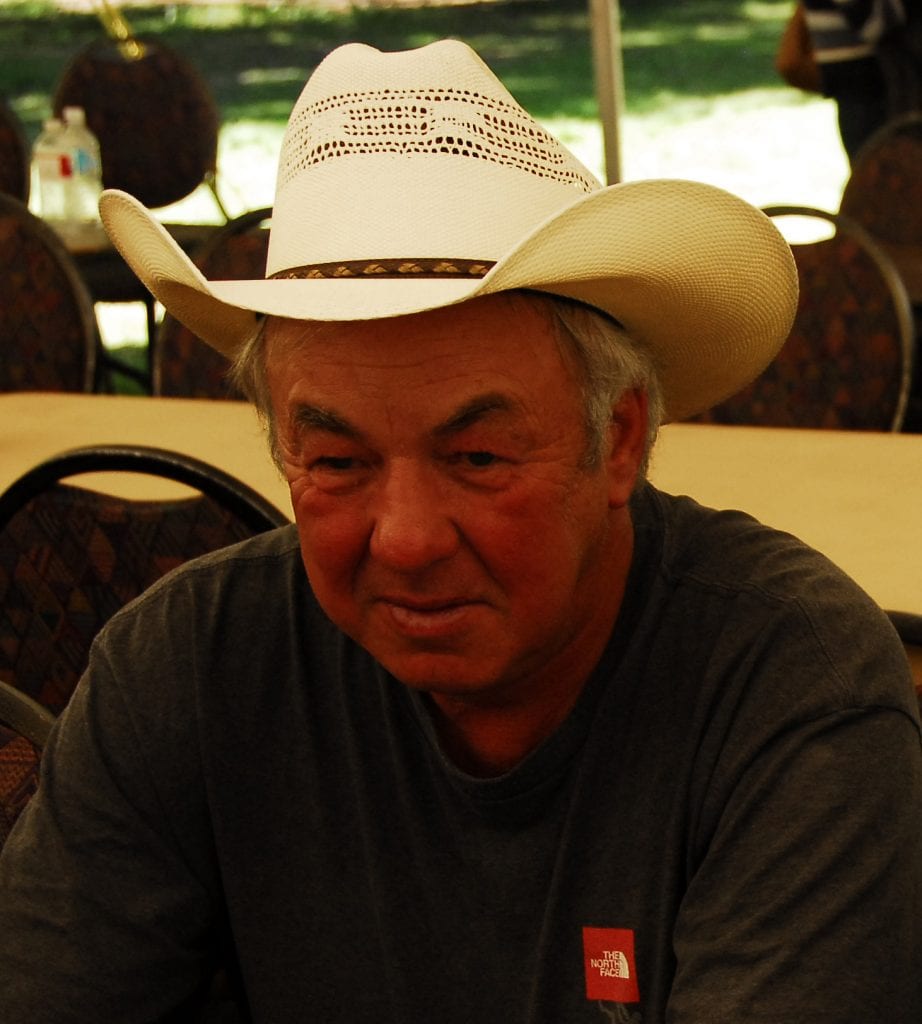
MD: This is an interview with Brian Wallace, and we’re up in Jasper, and the date is March 29, 2019. Thanks very much, Brian – and we really appreciate you doing this, and coming all the way from McBride. It’s really nice of you to do that.
Brian Wallace at the 2009 Warden Service Centennial, Banff. PWSAS photo collection.
Could you tell us your place and date of birth?
Brian: I was born in Wilkie, Saskatchewan, in 1948, Sept. 7. So I’m the ripe old age of 70.
MD: Where did you grow up – did you grow up in Wilkie?
Brian: On a farm…we lived on a farm between Wilkie and North Battleford. It was a great childhood growing up on a farm, because that’s where my love of horses started and it’s still going on. And I went to a country school two miles away, so it was horseback in the summertime, and we had a horse-drawn toboggan for the wintertime. And the odd time I’d ride my bike, but mostly the horse.
MD: That’s how you got to school?
Brian: Yeah, and they had a barn where you put your horse in – in the wintertime, especially in the winter – potential for the cold. And then I went to high school in Wilkie, Saskatchewan – it was 20 miles from the farm. That was an eye-opener for a little kid from the farm. The first day going to high school was just like the first day of kindergarten.
MD: Were you in a one-room schoolhouse – in the beginning?
Brian: Yes, from (Grades) 1 to 8. I didn’t leave home until I went to the University of Saskatchewan for a year, and very quickly decided university wasn’t for me. So I stayed with friends down in Saskatoon, so that was nice, and got my Honours in Hearts! And that was about it. And I had a cousin – my love was always outdoors – growing up on a farm and stuff, so my cousin and her husband lived in Edmonton. And he was taking a course at NAIT, the Northern Alberta Institute of Technology, in Edmonton, and so I got the program and found this Forestry program. So I stayed with them, and took a first year Forestry program there. And then our second year was in Hinton. And so I was moving closer and closer to the rocks. And while I was in Hinton, I met my first warden. And that was about the time that the warden service was trying to upgrade their education, and that’s when a lot of us got hired on from the technology schools – around 1969. So ’68 was when I went to Hinton to go to school, and met quite a few of the wardens there. So I spent lots of time with them, and got to know a warden – Ron Langevin, and he ended up in Banff, but he was out at a place called Snaring, just out of town here. So I would come out and visit with him. So when we graduated, there were 34 kids that graduated, and 32 had jobs with all these different forest industries. Myself, I didn’t want to do that – into the forestry, I was set on National Parks. So what did I do? The last day that I was around Hinton, there was an interview for a Labourer in Jasper National Park – so that was my in. That was in May,1969.
MD: Did they give you housing back then?
Brian: Yeah, sort of! A bunch of trailers – just across the tracks in the industrial area. And so I worked there for a month – so now I’ve gone to school for 15 years, and I’m picking rocks for the Highways Department? And I did a good job. So I thought this is not right, so I thought I’d go and talk with – I arranged a little talk with Mickey McGuire, the Chief Park Warden at the time. I went up and just talked with him, and said, “You know…I’d really like to become a warden (and I was thinking of going back to Saskatchewan and cruising timber, just to get more experience?) He said, “Well…pretty much, the experience you need to get on with the Warden Service is to work under somebody for a while and learn the ropes”. So I thought “Well, that’s it…I’m done.” So we talked for about half an hour about my experiences, and he said, “ You know what?” We have an opening coming up in a couple of weeks.” The seasonal warden was quitting – he didn’t cut the mustard, and would I like to fill in, and not as a warden – still at my labourer wages, but I did the same thing that this other kid was doing in the Tonquin Valley. So two weeks later, and that was it. I was working under a warden, Toni Klettl – he’s passed away now. He was very hard to understand – he was Austrian, but I managed to. There was one cabin out there. So I worked there for the summer, and by then my labourer job should have finished. I don’t know who he talked to, but at that time they were doing an elk slaughter. They had to reduce the herd by 250 animals. So, again the Chief Park Warden asked me if I’d like to stay on for the winter…Yeah!
MD: And what were you doing with the elk slaughter?
Brian: I was one of the gofers, I guess…skinning, and dealing with all of it.
MD: And what did they do with the elk meat?
Brian: They set up an abattoir at the old barns – these rock buildings – they were built back around the 20’s. In Jasper, that’s where the government kept their horses and they had a blacksmith’s shop and this abattoir. So we brought all the elk in there, quartered them up, and cheese clothed them, and then we loaded them into the back of dump trucks, and they would go out to Edmonton to the reserve there, lift the hoist, and elk would come out. But it was somewhat of a waste because the guys would go back a couple of weeks later with another load, and some of the quarters would be still laying there where they had dropped it.
MD: So how many elk did you slaughter?
Brian: 252.
MD: There wasn’t the big opposition back then to slaughtering elk?
Brian: That was the last. The population had gone too high, and that was the way to deal with it. So that was ‘69/’70, and in the winter of ‘73/’74, we got a huge snow – it was a huge snow year, and it took the elk down. But then they rebounded of course. The first one (’69) – that was their way of game management back in the day – it was shooting stuff, like bears too. Like some of the stories on the Rocky River, where there were a lot of grizzly bears – that was game management back in the days.
MD: (back to what made you want to join the Warden Service)…
Brian: And I guess a big appeal to me was the opportunity of working with the horses in the backcountry. And I was lucky enough – the first summer of ’69, when I was working with Toni Klettl, there was a fellow by the name of Slim Haugen – he was the government packer. And he was an old cowboy, and so I had the opportunity of working with him for probably a month and a half or two months – September and part of October. And we did a lot of packing – the trail crews into the Tonquin. And so I learned the ropes from an old experienced cowboy… how to pack horses, and look after horses., and that whole bit.
MD: But you would have learned some of that (on the farm?)
Brian: Yeah, but I had never packed – it was more chasing cows. So I was lucky that way, and in September we went around the south boundary, and that’s when we put up radio towers. We packed all the gravel in pack boxes, and put one up at Isaac Creek, and one at Cairn Pass, and we put a metal roof on a little cabin called Southesk, so we went out there for probably three weeks doing all the stuff…all with horses.
MD: Did you work in any other parks other than Jasper?
Brian: Well, I did, in ’94…’95, somewhere in there, I got a phone call from Gaby Fortin. And he said, “Brian, we need your help.” Elk Island National Park… it was a mess. And would I consider going to Elk Island, and act as Superintendent. So I said, “Not a chance!” Because I was Backcountry Manager, and had the world by the tail, and so Paul Galbraith called me up – actually Darro Stinson called me too, and said, “You know, Brian, you should really look at this, and take this opportunity because it will be good for your career.” So I said, “ You know, Darro, I am very happy where I am.” – he was working with Gaby and Donna
Petrachenko at the time. Then shortly after that, I was into Paul’s (Galbraith) office, and he said, “Brian, you should take this job. You owe the outfit something.” And I thought…”I owe the outfit something – yeah, I guess I’ve got a pretty good job”. So between Darro and Paul, they convinced me. So, another fellow – he was the Finance guy here – Keith Shepherd – he and I drove out to meet Donna, and Gaby, and Darro in Edmonton. And at that time…this was a particularly goofy time in Parks, because we ended up under…oh, what was it…
MD: Heritage?
Brian: Yes! Heritage Canada. So this Adrian fellow was sort of the Manager of Elk Island in that region, and so we met him first, and then out to Elk Island. It reminded me of the Mafia – you know, you drive out in these two different cars, and get out, and… and so we get there, and then we drive into the compound, and you meet the staff. OK, these are the people that are coming in to…Blah, blah, blah…OK. So that was fine, so I go home, and a week later, I go out by myself, and Keith had other stuff to clean up here. So I went out and I can remember this clear as day – the first morning I walked over from the Superintendent’s house to get a cup of coffee, and I sit down behind my desk, and I thought, “What am I doing here?” “Why did they? What am I supposed to do?” So I thought, I’ve gotten this far by being myself – I guess that’s what I’ll do! So, as far as rewarding things in my career, that was one of the most rewarding experiences I ever had. Everybody hated everybody – it was just a bunch of backstabbing, and so we brought that thing around. There were tears in my eyes when I left.
MD: How long were you there for?
Brian: Just a year and two months, and Keith left before I did. He helped with finances, plus he helped finish off the Park Management Plan. And I was the more operational guy, getting people liking each other. And what it came down to was first of all, I remember taking the carpenter on a little trip around the park. He was to show me what needed to be done. And so we got back to the compound, and I said, “OK.” He says, “Well, now what?” And I said, “What I’d like from you, Del, is to make up what needs to be done – put it on paper, and I said, “I’ll get the money. You organize the contractors and stuff.” (He said) “Me?” And I said, “Yes! You know what you’re doing – I don’t.” And I did that with the different departments, and what they were lacking was the responsibility. It was all this micro-managing stuff. And then the fence crew – of course, in Elk Island, it’s all fenced, and the same thing, they had let this one guy go, the foreman – this old farmer. I went to bat for him and got him back, and away we went. The same with every department – everybody started to like each other, and work together. I guess they were in their own little silos, and “Don’t Enter”, so we changed that. So when Keith and I left there, well – especially me, I felt pretty sad, but I guess I was smart and came back to Jasper….to my “backcountry management job”? I just get back – Paul Galbraith was Acting Superintendent, and he said, “Brian, (and this is I think ’96? – somewhere in there, anyway). The East Gate had got run over by a transport (truck) in the middle of the night, and thank goodness nobody was in there – no staff, and the building was done – it was all over the road in pieces…and so the gate staff wouldn’t go back to work, of course…why would they!? And because it was the same out at the West Gate. (Too dangerous) And so Paul asked me if I would (more than asked me) – I was informed that I’d be the Frontcountry Manager (laughs), and so I worked there for a couple of years.
And, again, it was really rewarding too, because – the gate people needed a job, so we got this roving program where they would go to different places and check for park passes and sell park passes. And then in the meantime, we went to bat and built a new East Gate.
MD: So you became sort of a trouble-shooter after a while.
Brian: I guess! And the same goes with the gate staff – I remember this clearly as well – is that we’re having a meeting up in the Superintendent’s Office – we just needed a big room, and we had one of the union guys there – he was one of the gate staff. And there was a few of them that were kind of challenging… and so I’m explaining what’s going to happen, and this guy just said “No…you’re all talk and it’s going to be the same as in the past, and nothing’s going to come of this.” Mildred Hughes was one of the gate staff, and she got up and said, “You know what, you guys? Let’s give Brian a chance.” And so then, we started making a team, and that’s what it’s all about. And so, we went and got a gate there, and got a gate down south.
MD: So I guess Elk Island was the only other park that you ever worked in?”
Brian: Yes. Most of the time in Jasper, and of course visited other parks, as I was Fire Boss on the Fire Command Team – so Wood Buffalo, Rev/Glacier, Banff, and different places like that, so got to move around quite a bit.
MD: Who came into Elk Island after you?
Brian: Bill Fisher
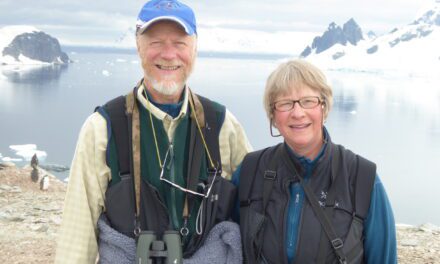
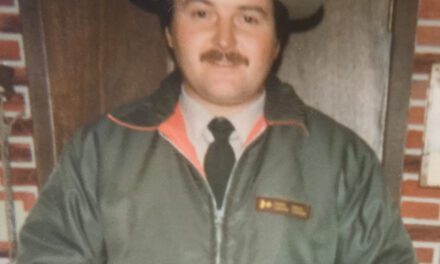
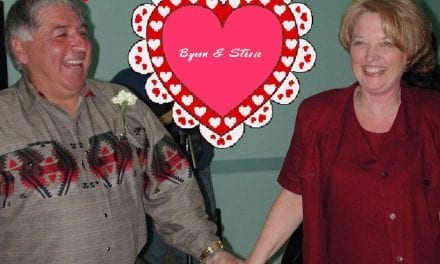
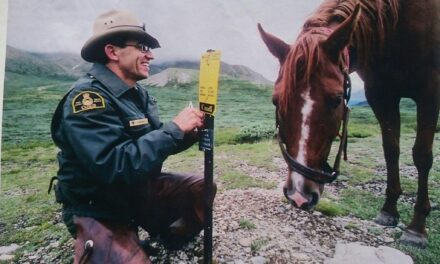
Recent Comments